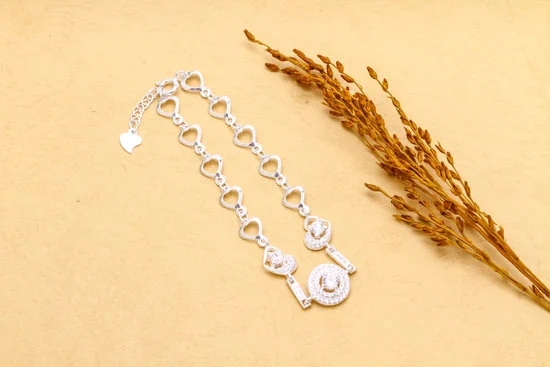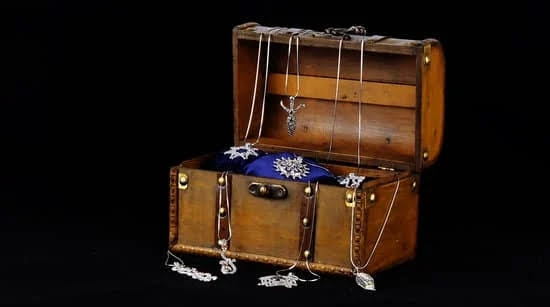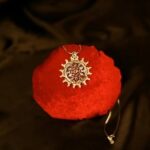Are you considering opening a fine jewelry store? Whether you have a passion for exquisite gems and metals or see the potential in the market, starting a fine jewelry business can be an exciting and profitable venture. In this article, we will explore the essential steps to successfully open a fine jewelry store, from conducting market research to creating a luxurious customer experience.
Fine jewelry has always held a special place in people’s hearts, symbolizing love, status, and personal style. With the growing demand for luxury goods, the market for fine jewelry continues to thrive. Opening a fine jewelry store allows you to tap into this lucrative industry and offer customers timeless pieces that hold sentimental value and lasting beauty.
In the following sections, we will delve into various aspects of establishing a successful fine jewelry business. From identifying your target market and crafting a solid business plan to selecting high-quality inventory and creating an unforgettable shopping experience, this guide will provide you with invaluable insights on how to navigate the intricate world of fine jewelry retail.
Whether you are an experienced jeweler or new to the industry, this article will equip you with the knowledge and resources needed to launch your own fine jewelry store.
Market Research
One effective way to identify the target market is by analyzing data from industry reports, census information, and other relevant sources. This data can help determine the age, income level, and lifestyle of potential customers who are likely to purchase fine jewelry. Additionally, conducting surveys, interviews, and focus groups can provide subjective feedback that complements quantitative data.
Consumer preferences are also a critical factor to consider when opening a fine jewelry store. Preferences can range from the type of metal and gemstones preferred to design styles such as traditional, modern, or vintage. Understanding these consumer preferences will help in deciding which products to stock and will help in developing a marketing strategy that resonates with potential customers.
Furthermore, analyzing competitors’ offerings and customer base can provide insight into what is missing in the current market and where opportunities exist for a new fine jewelry store to make its mark.
| Market Research Insights | Data |
|---|---|
| Determining Target Market Demographics | Analyze industry reports, census information |
| Understanding Consumer Preferences | Conduct surveys, interviews, analyze competitors’ offerings |
Business Plan
Before diving into the world of fine jewelry retail, it is essential to have a well-thought-out business plan in place. This plan should outline your objectives, target market, competition analysis, marketing strategies, financial projections, and more. A comprehensive business plan not only helps you stay focused on your goals but also serves as a crucial tool when seeking funding from investors or financial institutions.
To begin crafting your business plan, consider conducting thorough market research to identify the demand for fine jewelry in your chosen location. Understand the demographics and preferences of your target market to tailor your product offerings and marketing strategies accordingly. Additionally, outline your unique selling proposition (USP) that sets your fine jewelry store apart from others in the market.
Once you have a solid business plan in place, it’s time to secure funding to bring your vision to life. Whether you choose to seek investment from private investors, apply for small business loans, or explore other financing options, having a clear and detailed business plan will significantly increase your chances of securing the necessary funding for opening and running a successful fine jewelry store.
In summary, crafting a solid business plan is essential when venturing into the world of fine jewelry retail. By conducting thorough market research and identifying your USP, you can outline a clear roadmap for success. With a well-crafted business plan in hand, you can confidently approach potential investors or lenders to secure the funding needed to open a fine jewelry store.
Location and Space
When opening a fine jewelry store, choosing the perfect location is crucial to its success. You’ll want to find a spot that sees high foot traffic and is easily accessible to your target market. Consider setting up shop in an upscale shopping district or a trendy neighborhood known for its luxury boutiques. Research the demographics of the area to ensure that it aligns with the preferences and purchasing power of your ideal customers.
Once you’ve secured the right location, it’s time to design a unique space that reflects the elegance and sophistication of your fine jewelry offerings. Create a welcoming atmosphere that exudes luxury, using high-quality materials and tasteful decor. Consider enlisting the help of professional designers or architects who specialize in creating retail spaces, as they can help bring your vision to life.
To further enhance the ambiance of your store, invest in proper lighting to showcase your jewelry pieces in their best light. Display cases should be strategically placed to allow for easy browsing while also ensuring security for your valuable inventory. It’s also important to consider comfortable seating areas where customers can take their time exploring your collection and making selections.
When designing your space, incorporate branding elements such as logos, colors, and signage that will leave a lasting impression on visitors. Your goal is to create a memorable and immersive shopping experience that will keep customers coming back for more.
- Research high-traffic areas for potential location
- Hire professionals for interior design and layout
- Create a welcoming ambiance with proper lighting and comfortable seating
Inventory
Building Relationships With Suppliers
One of the key factors in opening a fine jewelry store is sourcing high-quality products from reliable suppliers. Building strong relationships with reputable jewelry manufacturers, designers, and wholesalers is crucial to ensure that your inventory meets the standards of fine jewelry. Researching potential suppliers, attending trade shows, and networking within the industry are effective ways to connect with sources of exquisite jewelry pieces.
Curating a Diverse Collection
To appeal to a wide range of clientele, it’s important to curate a diverse collection of fine jewelry pieces. This includes a variety of designs, gemstones, metals, and price points to cater to different tastes and budgets. Keeping up with current trends in the industry while also offering timeless classics can help set your inventory apart from competitors.
Quality Control Measures
Ensuring the authenticity and quality of the merchandise is essential for a fine jewelry store. Implementing strict quality control measures such as conducting thorough inspections, obtaining certifications for gemstones and metals, and guaranteeing product warranties can build trust with customers. Additionally, staying informed about ethical sourcing practices and environmental sustainability in the jewelry industry can appeal to conscientious consumers.
By carefully selecting suppliers, curating a diverse collection, and implementing quality control measures, you can ensure that your fine jewelry store offers only the highest quality products that will attract discerning customers seeking luxurious pieces.
Branding and Marketing
Brand Identity
When it comes to opening a fine jewelry store, having a strong brand identity is crucial. This involves creating a unique and recognizable image that sets your store apart from competitors. Your brand identity should reflect the high-end nature of your products and appeal to your target market. This can include elements such as logo design, color palette, typography, and overall aesthetic.
Investing in professional branding services or working with experienced graphic designers can help you develop a cohesive and visually appealing brand identity for your fine jewelry store. Remember that your brand identity will be present across all aspects of your business, from signage and packaging to online platforms and advertising materials.
Effective Marketing Strategies
Once you have established a solid brand identity, it’s important to focus on effective marketing strategies to promote your fine jewelry store. This can include both traditional methods such as print advertisements in luxury magazines and event sponsorships, as well as digital marketing efforts like social media advertising, influencer partnerships, and email campaigns.
Understanding your target market is crucial for developing effective marketing strategies. By identifying the preferences and behaviors of your clientele, you can tailor your marketing efforts to reach them more effectively. Additionally, hosting exclusive events or trunk shows can create buzz around your store and attract potential customers who are interested in high-quality fine jewelry pieces.
Utilizing a mix of both traditional and digital marketing approaches can help increase the visibility of your fine jewelry store and ultimately drive sales. It’s important to regularly evaluate the performance of your marketing efforts to make adjustments as needed based on customer response and market trends.
Public Relations
In addition to traditional advertising methods, public relations play an essential role in building the reputation of a fine jewelry store. Developing relationships with industry influencers, fashion stylists, editors of luxury publications along with celebrities interested in wearing high-end jewelry pieces from independent brands or artisans gives you an opportunity for more exposure which may lead to endorsements or advertising opportunities.
By leveraging public relations tactics such as press releases, media outreach initiatives events collaboration with local charities brings more exposure by being showcased in various publications enhancing exposure locally entices potential clients driving new traffic to the storefront.
Legal Considerations
When opening a fine jewelry store, it is crucial to navigate and understand the legal requirements and regulations that come with running this type of business. One of the most important legal considerations is obtaining the necessary permits and licenses to operate as a retail establishment.
This may include a general business license, sales tax permit, and possibly specific licenses for selling jewelry or precious metals, depending on local regulations. It’s essential to research and comply with federal, state, and local laws regarding the sale of jewelry to avoid any legal issues down the line.
Additionally, when dealing with high-value items such as fine jewelry, it is imperative to have a comprehensive insurance policy in place to protect your inventory from theft, loss, or damage. This may also extend to liability insurance in case a customer experiences an issue with a purchased item. Understanding the legalities of insurance coverage for your fine jewelry store will provide peace of mind and financial protection in case of unforeseen circumstances.
Another important legal consideration for a fine jewelry store is ensuring compliance with consumer protection laws. This may include regulations regarding product labeling, disclosure of metal content or gemstone treatments, and warranties for sold items.
Familiarizing yourself with these laws will not only keep you in good standing legally but also build trust and confidence with your customers. By meeting all legal requirements and regulations, you can operate your fine jewelry store ethically while providing quality products and service to your clientele.
Customer Experience
Creating a luxurious and unforgettable shopping experience is essential for a fine jewelry store. This section will explore some key elements that are crucial in providing an exceptional customer experience in this niche market. One of the first steps in creating a luxurious shopping experience is to focus on the ambiance and aesthetics of the store.
Fine jewelry stores should be visually appealing and designed to exude an air of elegance and sophistication. The decor, lighting, and overall layout should be carefully curated to complement the beauty of the jewelry on display.
In addition to the physical space, providing personalized service is paramount in creating a luxurious shopping experience for clientele. This can include offering one-on-one consultations, customization options, and attentive assistance from knowledgeable staff members. Building strong relationships with customers by understanding their preferences and requirements can also enhance their overall experience.
Furthermore, offering additional amenities such as refreshments, comfortable seating areas, and specialized events can elevate the luxury shopping experience. Hosting exclusive events like trunk shows or private showcases for loyal customers can create a sense of exclusivity and make clients feel valued. These thoughtful gestures contribute to making the fine jewelry buying process a memorable and enjoyable one for patrons.
Lastly, ensuring that each customer feels appreciated even after their purchase is crucial for building long-term relationships. This involves providing excellent after-sales service, genuine appreciation for their business, and perhaps even creating a loyalty program to incentivize repeat purchases.
| Elements | Importance |
|---|---|
| Ambiance & Aesthetics | To exude elegance and sophistication |
| Personalized Service | To build strong relationships with customers |
| Additonal Amenities | To elevate the luxury shopping experience |
Staffing
When it comes to running a fine jewelry store, having knowledgeable and passionate staff members is essential to providing customers with an exceptional shopping experience. In order to ensure that your staff is able to effectively assist clientele in finding the perfect piece of jewelry, it’s important to carefully consider the hiring process.
One of the first steps in hiring staff for a fine jewelry store is seeking individuals who have a genuine passion for jewelry and gemstones. Look for candidates who are not only knowledgeable about different types of jewelry, but who also possess a deep appreciation for the craftsmanship and artistry that goes into creating fine pieces.
This could include individuals who have previous experience working in high-end retail or who have studied gemology and have a strong understanding of various gems and precious metals.
In addition to passion and knowledge, it’s important to seek out individuals who have excellent customer service skills. Working in a fine jewelry store requires interacting with clients in a professional and courteous manner, so look for candidates who are personable, attentive, and able to effectively communicate with customers.
This will help create a welcoming atmosphere in your store and leave customers feeling satisfied with their shopping experience. By carefully selecting staff members who embody these qualities, you can ensure that your clientele receives the level of service they expect from a fine jewelry establishment.
Online Presence
In today’s digital age, having a strong online presence is crucial for any business, and the fine jewelry industry is no exception. With the rise of e-commerce, establishing an e-commerce website is essential to reach a broader audience and maximize sales potential. By creating an online platform, fine jewelry store owners can expand their customer base beyond their physical location and appeal to tech-savvy consumers who prefer the convenience of shopping online.
When it comes to opening a fine jewelry store, understanding the importance of an online presence cannot be overstated. A well-designed website can showcase the store’s inventory and provide information about the brand, as well as create a seamless shopping experience for customers.
By implementing search engine optimization (SEO) strategies and utilizing social media platforms, store owners can increase their visibility and attract potential customers. Additionally, offering secure online transactions and reliable shipping options can instill trust in shoppers and encourage repeat business.
In conclusion, when planning to open a fine jewelry store, incorporating a strong online presence is essential for success in today’s market. By following the outlined steps from conducting market research and crafting a solid business plan to developing effective marketing strategies and creating a luxurious shopping experience for clientele, entrepreneurs can establish a thriving business.
Embracing e-commerce and establishing an impressive online platform will allow fine jewelry stores to connect with a broader audience and flourish in the competitive industry.
Frequently Asked Questions
How to Start a Fine Jewelry Business?
Starting a fine jewelry business requires careful planning and consideration. Research the market to identify your target audience and understand their preferences. Secure funding for inventory, equipment, and marketing. Establish relationships with reputable suppliers and create a strong brand identity. Additionally, it’s important to comply with regulations and obtain any necessary licenses or permits.
Is Selling Fine Jewelry Profitable?
Selling fine jewelry can be profitable if done strategically. By offering unique and high-quality pieces, targeting the right customer base, and providing exceptional customer service, a jewelry business can generate significant profits. However, it’s essential to carefully manage expenses, keep up with industry trends, and adapt to changing consumer demands in order to sustain profitability over time.
Is Owning a Jewelry Store Profitable?
Owning a jewelry store has the potential to be profitable, but success is not guaranteed. Factors such as location, competition, overhead costs, and the ability to effectively market and sell inventory all play a role in determining profitability.
Owners must also consider ongoing expenses such as rent, utilities, insurance, and staffing when assessing the potential for financial success in the jewelry retail industry.

Welcome to my jewelry blog! My name is Sarah and I am the owner of this blog.
I love making jewelry and sharing my creations with others.
So whether you’re someone who loves wearing jewelry yourself or simply enjoys learning about it, be sure to check out my blog for insightful posts on everything related to this exciting topic!





